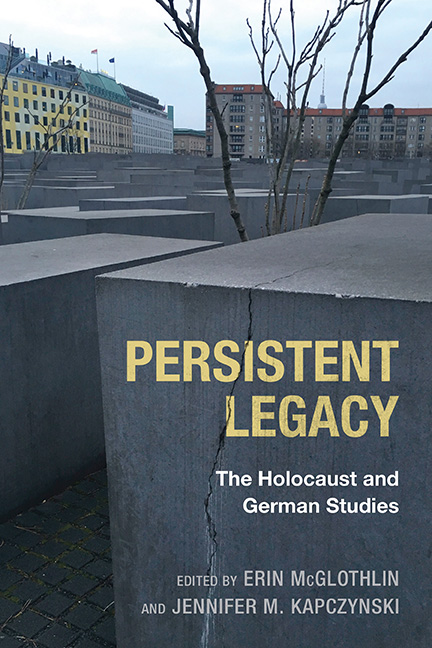Book contents
- Frontmatter
- Contents
- Acknowledgments
- Introduction
- Part I Abiding Challenges
- Part II The Holocaust in German Studies in the North American and the German Contexts
- Part III Disentangling “German,” “Jewish,” and “Holocaust” Memory
- Part IV Descendant Narratives of Survival and Perpetration
- Part V Remediated Icons of Memory
- Part VI Holocaust Memory in Post-Holocaust Traumas
- Notes on the Contributors
- Index
5 - Epistemology of the Hyphen: German-Jewish-Holocaust Studies
Published online by Cambridge University Press: 17 June 2021
- Frontmatter
- Contents
- Acknowledgments
- Introduction
- Part I Abiding Challenges
- Part II The Holocaust in German Studies in the North American and the German Contexts
- Part III Disentangling “German,” “Jewish,” and “Holocaust” Memory
- Part IV Descendant Narratives of Survival and Perpetration
- Part V Remediated Icons of Memory
- Part VI Holocaust Memory in Post-Holocaust Traumas
- Notes on the Contributors
- Index
Summary
THIS ESSAY EXPLORES the links and the disjunctions between German studies, Jewish studies, and Holocaust studies by first thinking about the hyphen between German-Jewish-Holocaust studies as a “third space”—a mark that both opens and potentially de/forms, enabling a polysemic textuality that complicates “Jewish” and “German” text and the matrix of German-Jewish history, memory, culture, and urban space. To speak of the hyphen as a “third space” that joins and separates the terms German and Jewish, however, is to merge—intentionally—discourses about German-Jewish culture with those about postcolonialism. To be sure, Homi Bhabha's “third space,” that hybrid space in which “the structure of meaning and reference [are] an ambivalent process,” the “cultural space” “where the negotiation of incommensurable differences creates a tension peculiar to borderline existences” operates in a distinctly different political field than the one that has occupied scholars of German and Jewish culture. And yet, I argue, the insights from Bhabha, Spivak, Butler, and others on the contingencies of postcolonial textuality and culture have much to contribute to the work of Jewish culture, including German-Jewish culture. For if we are to truly “locate” German-Jewish culture, and the resonance of the Holocaust within it, then we must take into account the complex, perhaps even “klezmerical,” mechanisms of place, history, and subject positions that have been at the center of discussions in literary and cultural studies of alterity.
I am less interested in exploring “hyphenated” national, ethnic, or disciplinary identities than in thinking more broadly about the disciplinary (in all senses of that word) role the hyphen plays in academic discourse about German-Jewish studies and the Holocaust. It is by now almost a truism that the abrasions, marks, and echoes of “the Jewish” are always present as traces within German text; similarly, the intrinsic Jewishness of German studies and the fundamental Germanness of Jewish studies point to the porousness and entanglement of the textual, philosophical, and cultural encounter between German and Jew. I thus propose that we think about the hyphen not as a mark of constriction or of limits, nor as a mark that preserves separate terms even while placing them in relation to each other, but rather as a sign that invites a space of encounter into which we can enter and that enables us to expand the text beyond the borders of German studies, Jewish studies, and Holocaust studies.
- Type
- Chapter
- Information
- Persistent LegacyThe Holocaust and German Studies, pp. 107 - 119Publisher: Boydell & BrewerPrint publication year: 2016

